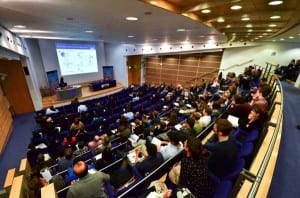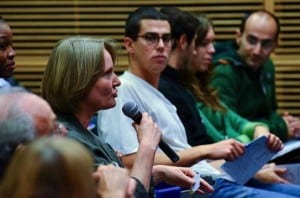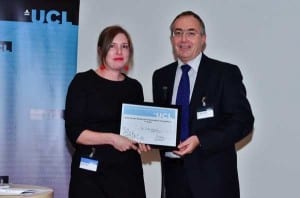Infection, immunology and inflammation research on show at annual Symposium
By news editor, on 23 October 2013
![]() Written by Andy Kumar (MRes Biomedicine 2012-13 ,UCL Institute of Child Health)
Written by Andy Kumar (MRes Biomedicine 2012-13 ,UCL Institute of Child Health)
There is no doubt about it. Medical research has come on leaps and bounds in recent years. Much of this is down to the vast amount of research being conducted worldwide, with both scientists and doctors working tirelessly to discover novel treatments for a vast array of medical conditions.
The annual Infection, Immunology and Inflammation Symposium held at the UCL Institute of Child Health showcased the research of a number of passionate UCL academics and its partners. With an almost fully packed auditorium, there was a real buzz among the attendees.
Cutting edge research
The morning session on infection contained some excellent presentations on microbial genome sequencing of methicillin resistant Staphylococcus aureus (MRSA) and the effects of antibiotic resistance upon the population delivered by Professor Sharon Peacock, as well as the genes involved in the pathogenesis of Mycobacterium tuberculosis by Dr Kristine Arnvig.
This really drilled home the message of how understanding the genetics of infectious pathogens better can lead to the development of novel antimicrobial treatments.
Pathogens developing resistance against our current arsenal of antibiotics is highly significant, and this research is absolutely essential to prevent morbidity and mortality, particularly in developing nations.
A further morning talk by Dr Richard Goldstein on “What has molecular evolution done for us?”, was particularly insightful, showing how the construction of biologically informed models can help decipher patterns of variation in gene sequences, with a view to characterise the effect of pathogenic mutations.
Poster showcase
Following an interesting set of morning lectures, we then moved onto a poster presentation session, showcasing some of the cutting-edge research being conducted at UCL by postdoctoral researchers and PhD students. A number of research posters were also on display – keenly viewed by attendees over lunch.
The afternoon commenced with immunology talks focusing on cancer biological therapy, T cell therapy, understanding signaling networks in cell proliferation and the use of dendritic cells in immunotherapy.
The final session was focused on inflammation, tissue remodelling and fibrosis. The opening speaker was Professor David Lomas, Dean of the Faculty of Medical Sciences, who described his laboratory’s unique approach to research into drug discovery for obstructive pulmonary disease, by naming newly identified small molecules involved in genomic correction after famous London sights and tube stations!
Further presentations included talks on better understanding the inflammatory process that drives tissue damage during atherosclerosis, stress responses in fibrotic lung disease and the pharmaceutical development of anti-fibrotic therapeutic interventions.
Provost’s Praise
The symposium drew to a close with a brief keynote speech from UCL President and Provost, Professor Michael Arthur. Full of praise for UCL, he highlighted the effectiveness with which members of our university work in a unique and interdisciplinary fashion, which was “engraved in the culture of this university”- a sentiment shared by faculty members and students alike.
Professor Arthur then awarded the prizes for both early career researcher posters, with first and second places being awarded to Dr Boghuma Titanji and PhD student Nisha Kanda, respectively. Awards for poster presentation talks were also presented, with Dr Sian Henson taking first place, and Dr Sophie Lourenco awarded second.
In conclusion, the symposium successfully illustrated the diverse and vital experimental and translational research being conducted throughout a number of UCL departments. The range of topics covered by a diverse group of speakers, including both early career researchers and senior academics, is truly representative of the universal passion within UCL’s research culture.
 Close
Close




